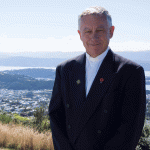WelCom September 2018:
Cardinal John Dew, Archbishop of Wellington

Cardinal John Dew.
‘For You Too’ – these words are from Gaudete et Exsultate, the document Pope Francis wrote earlier this year ‘On the Call to holiness in Today’s World’. When the Pope uses those words ‘For You Too’ in the first chapter of this document known as an Apostolic Exhortation, he is telling all of us very strongly that holiness is for everybody and that it is not impossible. Growing in holiness may be difficult at times, but with patience and perseverance we do grow closer to God. He actually writes:
“To be holy does not require being a bishop, a priest or a religious. We are frequently tempted to think that holiness is only for those who can withdraw from ordinary affairs to spend much time in prayer. That is not the case. We are all called to be holy by living our lives with love and by bearing witness in everything we do, wherever we find ourselves. Are you called to the consecrated life? Be holy by living out your commitment with joy. Are you married? Be holy by loving and caring for your husband or wife, as Christ does for the Church. Do you work for a living? Be holy by labouring with integrity and skill in the service of your brothers and sisters. Are you a parent or grandparent? Be holy by patiently teaching the little ones how to follow Jesus. Are you in a position of authority? Be holy by working for the common good and renouncing personal gain. (Gaudete et Exsultate 14)
If we are serious about growing in holiness, coming closer to God and living the Gospel intentionally every day, then clearly, we need to be people who reflect daily on how we are doing. St Ignatius of Loyola, whose feast day we celebrated on 31 July encourages us to engage in what he called ‘The EXAMEN’. He also said that even if we miss other prayers during the day, we should never neglect this time of EXAMEN. Usually the best time of the day for this is at the end of that day, taking a little time to reflect on how we have lived that day and how we have been present, or not present, to God and others.
Very briefly, the Examen is a method of reviewing your day in the presence of God. It is an attitude more than a method, a time set aside for thankful reflection on where God is in our everyday life. It has five steps, which most people take more or less in order, and it takes about 10 to 15 minutes each evening.
EXAMEN – in essence it is to:
1. Ask God for light
I want to look at my day with God’s eyes, not merely my own.
2. Give thanks
The day I have just lived is a gift from God. Be grateful for it.
3. Review the day
I carefully look back on the day just completed, being guided by the Holy Spirit.
4. Face your shortcomings
I face up to what is wrong – in my life and in me.
5. Look toward the day to come
I ask where I need God in the day to come.
Over the years I have found various questions to be helpful in this process of reflection and trying to be more aware of how my day has been. I share some of those with you in the hope they will also assist you in responding to this call to holiness.
‘Where has God been present in my life today? At work? In the car?’
‘Have I been a good memory in someone’s life today?’
‘Have I walked with someone today or spent time with someone or made their life a little brighter?’
‘How have I tried to be goodness and kindness to others – children – to your parents, to others at school?’
‘What thoughts of peace, justice, and love have I brought in to dwell in my heart? What thoughts of discord, criticism, and evil?’
‘How has God acted in my life today? How have I accepted or resisted God’s help?’
Remember that holiness is ‘For You Too’. The Pope proposed, or rather re-proposed ‘the call to holiness in a practical way for our own time, with all its risks, challenges and opportunities’. Of course, it is risky, and of course there are challenges, but there are also plenty of opportunities to be holy. There are plenty of opportunities to be men and women of love, joy, peace, patience, kindness, goodness, trustfulness, gentleness and self-control – the Fruits of the Holy Spirit. The times when we consciously live those fruits of the Holy Spirit, THAT IS HOLINESS!
Early in his letter the Pope writes, ‘When Cardinal François-Xavier Nguyên van Thuân was imprisoned, he refused to waste time waiting for the day he would be set free. Instead, he chose “to live the present moment, filling it to the brim with love”. He decided: “I will seize the occasions that present themselves every day; I will accomplish ordinary actions in an extraordinary way.’ (Gaudete et Exsultate 7)
Maybe all we have to do is to choose ‘to live the present moment, filling it to the brim with love’.